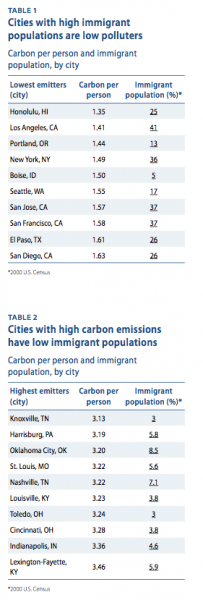Report: Immigrants Do Not Kill the Environment
In addition to taking jobs and increasing crime, anti-immigration groups have argued, immigrants are bad for their environment. For groups like the
Jul 31, 2020254.6K Shares3.5M Views
In addition to taking jobs and increasing crime, anti-immigration groups have argued, immigrants are bad for their environment. For groups like the pro-enforcement Center for Immigration Studies, reports on how illegal immigrants contribute to climate change and overcrowding are fairly common, and usually cite statistics claiming immigrants are to blame for America’s carbon footprint. The Center for American Progress released a reporttoday refuting these claims, finding immigrants often use less energy than native-born residents and are more supportive of pro-environment policies and candidates.
Here are a few of the major points:
- The assumption that immigrant-driven population growth alone drives the U.S. carbon footprint is false. The 10 highest carbon-emitting cities have an average immigrant population below 5 percent, according to a 2008 Brookings Institution study. [...]
- Immigrants, especially recent immigrants, tend to lead “greener” lifestyles than the native-born and are more likely to use public transportation and practice sustainable habits like compact living, conservation, and recycling. [...]
- Immigrants are disproportionately hurt by the dirty energy economy and face unique environmental challenges. Consequently, they fight for greener solutions, including challenging the use of hazardous pesticides in the agricultural fields where many immigrants work. A successful campaign by immigrant farm workers during the 1960s led to the banning of the dangerous pesticide DDT.
- 2010 polls of key electoral states find that immigrant-rich communities overwhelmingly favor policy that will create green jobs and tend to support congres- sional candidates who back efforts to fight global warming.
The main argument made by groups that tie environmental concerns to immigration is that immigration will increasethe population, which will in turn increase consumption, decrease open spaces and harm the environment. In some ways, this may be true: Immigrants from third-world countries in particular are likely to consume more energy in the U.S. than they did in their native countries.
But as the CAP report points out, many of the environmental arguments against immigration are heavily flawed because not all people impact the environment in the same way. Many of the cities with the lowest levels of carbon emissions have higher percentages of immigrants, while many cities with small immigrant populations have far higher carbon emissions:
Tying immigration to environmental concerns can have some serious consequences, particularly in the debate over whether volunteers should be allowed to leave water bottles in the Arizona desert for border crossers. Groups that push for more border enforcement argue illegal immigrants are destroying open spacesalong the U.S.-Mexico border by trekking through them into the U.S., and Minutemen reportedlyroutinely slash and drain bottles they find there. (They leave the bottles, which seems to point to a non-environmental motivation.) Meanwhile, representatives from a Tuscon-based group, No More Deaths, that leaves out bottles have been arrestedfor leaving garbage in a national refuge.

Rhyley Carney
Reviewer
Latest Articles
Popular Articles
